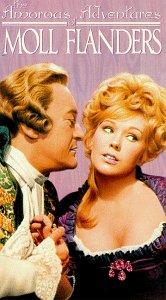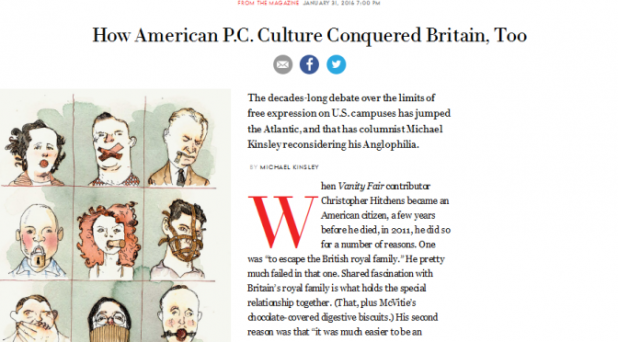Steve Sailer
VDARE
January 17, 2016
Michael Kinsley writes on the problem of not having a written First Amendment in Britain:
How American P.C. Culture Conquered Britain, Too
… Henry Porter, Vanity Fair’s London editor and a prominent British journalist in the anti-P.C. camp, reported talking to a group of [British] students recently. “I realized,” he explained, “that these kids have very few thoughts on the subject of liberty and far too many on the subject of personal rights and various classes of victimhood.” Porter noted that “this is one reason why the liberties that were accepted as being part of the British tradition, but are not written down anywhere, are so easily being attacked and readily abandoned.”
By the way, an interesting analogy to the growth of P.C. that might be worth studying in detail is the process by which Victorian restrictions on sex as a subject in literature emerged.
A lot of 18th Century novels, such as Fielding’s Tom Jones and Defoe’s Moll Flanders, were roughly PG-13 rated. For example, the full title of Defoe’s 1722 follow-up to Robinson Crusoe, was:
The Fortunes and Misfortunes of the Famous Moll Flanders, &c. Who was Born in Newgate, and during a Life of continu’d Variety for Threescore Years, besides her Childhood, was Twelve Year a Whore, five times a Wife (whereof once to her own Brother), Twelve Year a Thief, Eight Year a Transported Felon in Virginia, at last grew Rich, liv’d Honest, and died a Penitent. Written from her own Memorandums.
But by the mid-19th Century novels tended to be pretty close to G-rated.
 That process by which this slowly reversed in the 20th Century is well-known, with celebrated landmarks like Ulysses, Lady Chatterley’s Lover, and Lolita. A movie adaptation of Tom Jones won the 1963 Best Picture Oscar as symbolic of the revolt against Victorian restrictions. You don’t hear much about that movie anymore, but it was a big deal at the time. In 1965, the Amorous Adventures of Moll Flanders starring Kim Novak was a follow-up.
That process by which this slowly reversed in the 20th Century is well-known, with celebrated landmarks like Ulysses, Lady Chatterley’s Lover, and Lolita. A movie adaptation of Tom Jones won the 1963 Best Picture Oscar as symbolic of the revolt against Victorian restrictions. You don’t hear much about that movie anymore, but it was a big deal at the time. In 1965, the Amorous Adventures of Moll Flanders starring Kim Novak was a follow-up.
But I don’t know much about the beginnings of Victorianism. My hunch is that it seemed like a good idea at the time. Idealistic and/or status-striving young people perhaps demanded it?
 Daily Stormer The Most Censored Publication in History
Daily Stormer The Most Censored Publication in History



